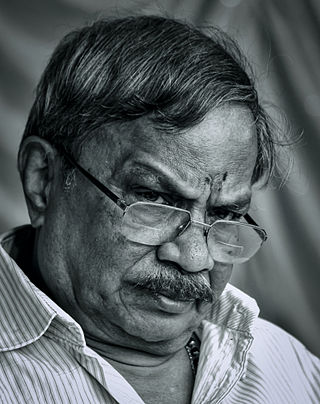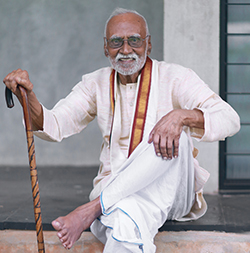Related Research Articles

Vayalar Ramavarma, also known as Vayalar, was an Indian poet and lyricist of Malayalam language. He was known for his poems which include Sargasangeetham, Mulankaadu, Padamudrakal, Aayisha and Oru Judas janikkunnu and for around 1300 songs he penned for 256 Malayalam films. He received the National Film Award for Best Lyrics in 1972 and was the winner of the Kerala State Film Award for Best Lyricist in its year of inception which he received three more times. He was also a recipient of the Kerala Sahitya Akademi Award for Poetry in 1962. His collaborations with G. Devarajan produced the golden era of Malayalam film music and many songs written and composed by these duo remain the ever green classics in Malayalam. Ramavarma is regarded as one of the most successful and critically acclaimed lyricist in the history of Malayalam cinema.

Amrish Puri was an Indian actor, who was one of the most notable and important figures in Indian cinema and theatre. He acted in more than 450 films, established himself as one of the most popular and iconic actors in Indian cinema. Puri is remembered for playing various roles in variety of film genres, specially iconic villainous roles in Hindi cinema, as well as international cinema. He reigned supreme in villainous roles in the 1980s and 1990s, his dominating screen presence and distinctive deep voice made him stand out amongst the other villains of the day. Puri was active in both art cinema such as in some of Shyam Benegal and Govind Nihalani's films as well as in mainstream cinema. Puri won three Filmfare Awards for Best Supporting Actor in eight nominations. He also holds most Filmfare Award for Best Villain nominations.

Madath Thekkepaattu Vasudevan Nair, popularly known as M.T., is an Indian author, screenplay writer and film director. He is a prolific and versatile writer in modern Malayalam literature, and is one of the masters of post-Independence Indian literature. At the age of 20, as a chemistry undergraduate, he won the prize for the best short story in Malayalam at World Short Story Competition conducted by The New York Herald Tribune. His first major novel Naalukettu, written at the age of 23, won the Kerala Sahitya Akademi Award in 1958. His other novels include Manju (Mist), Kaalam (Time), Asuravithu and Randamoozham. The deep emotional experiences of his early days have gone into the making of MT's novels. Most of his works are oriented towards the basic Malayalam family structure and culture and many of them were path-breaking in the history of Malayalam literature. His three seminal novels on life in the matriarchal family in Kerala are Naalukettu, Asuravithu, and Kaalam. Randamoozham, which retells the story of the Mahabharatha from the point of view of Bhimasena, is widely credited as his masterpiece.
Anita Desai, born Anita Mazumdar, is an Indian novelist and the Emerita John E. Burchard Professor of Humanities at the Massachusetts Institute of Technology. As a writer she has been shortlisted for the Booker Prize three times. She received a Sahitya Akademi Award in 1978 for her novel Fire on the Mountain, from the Sahitya Akademi, India's National Academy of Letters. She won the British Guardian Prize for The Village by the Sea (1983). Her other works include The Peacock, Voices in the City, Fire on the Mountain and an anthology of short stories, Games at Twilight. She is on the advisory board of the Lalit Kala Akademi and a Fellow of the Royal Society of Literature, London.

Om Prakash Puri, was an Indian actor who appeared in mainstream commercial Hindi films as well as Malayalam, Bengali, Kannada, English, Punjabi, Gujarati, Telugu, and Marathi films, as well as independent and art films and also starred in several international cinema. He is widely regarded as one of the finest actors in world cinema. He won two National Film Awards for Best Actor, two Filmfare Awards and India's fourth highest civilian award Padma Shri in 1990. In 2004, he was made an honorary Officer of the Order of the British Empire.

Deepti Naval is an Indian-American actress, director, and writer, predominantly active in Hindi cinema.

Parutholli Chalappurathu Kuttikrishnan, popularly known by his pen name Uroob was an Indian writer of Malayalam literature. Along with Basheer, Thakazhi, Kesavadev, and Pottekkatt, Uroob was counted among the progressive writers in Malayalam during the twentieth century. He was known for his novels such as Sundarikalum Sundaranmarum and Ummachu, short stories like Rachiyamma and the screenplays of a number of Malayalam films including Neelakuyil, the first Malayalam feature film to receive the National Film Award. He was a recipient of several honours including Kendra Sahithya Academy Award and the inaugural Kerala Sahitya Akademi Award for Novel.

Sa. Kandasamy was a novelist and documentary film-maker from Mayiladuthurai in the Indian state of Tamil Nadu. He won the Sahitya Akademi Award in Tamil for his novel, Vicharanai Commission in 1998.
Shantata! Court Chalu Aahe is a Marathi play written by Indian playwright Vijay Tendulkar in 1963 and first performed in 1967, directed by Arvind Deshpande, with Sulbha Deshpande as the main lead.
Madabhushi Rangadorai, better known by his pen name Randor Guy, was an Indian lawyer, columnist and film and legal historian associated with the English language newspaper The Hindu. He was also the official editor of the weekly column "Blast from the Past" that appeared in The Hindufor many years; in this series Randor Guy wrote about not so well known details about the Tamil movies and the personalities, produced since mid 1930s to late 1960s.

Rayangala Shri Krishna Raja Narayana Perumal Ramanujam Naicker, shortened to Ki. Rajanarayanan and popularly known by his Tamil initials as Ki. Ra., was an Indian Tamil language folklorist and acclaimed writer from Kovilpatti, in Tamil Nadu. Some of his popular works include Gopalla Grammam, Gopallapurathu Makkal, Mayamaan, and Nattuppura Kadhai Kalanjiyam. He was a recipient of the Sahitya Akademi Award in 1991.The Times of India called him the "Guardian of Tamil oral tradition".
Batlagundu Subramanian Ramiah was a Tamil writer, journalist, and critic from Tamil Nadu, India. He was also a script and dialogue writer in Tamil films.
Kovi Manisekaran was an Indian Tamil scholar, film director and actor. He was awarded Sahitya Akademi Award for Tamil for his historical novel Kutrala Kurinji in 1992.

Chunilal Madia was a Gujarati author from Gujarat, India, primarily known for his novels and short stories set in rural Saurashtra. Recipients of several awards, he is considered one of the leading writers of Gujarati literature.

Smarakasilaka is a Malayalam novel written by Punathil Kunjabdulla in 1977. The story of the novel is woven around a mosque and its surroundings. The key figure is Khan Bahadur Pookkoya Thangal of the rich Arakkal family whose character is a rare mixture of dignity, benevolence and insatiable lust.
K. Hariharan is an Indian film director who has directed films in Tamil, Marathi and Hindi. Currently he is the professor of Film Studies at Krea University. Born in Mumbai, Maharashtra, his father H.Krishnan was the Chairman of Eastman Kodak. An alumnus of the Film and Television Institute of India (FTII), Hariharan formed "Yukt Film Co-operative" in 1976 together with his batch mates to make an experimental film called Ghashiram Kotwal. Ezhavathu Manithan, his directorial debut in Tamil cinema, won the National Film Award for Best Feature Film in Tamil and was nominated for Golden St. George at the Moscow International Film Festival.
Omchery N. N. Pillai is an Indian Malayalam–language playwright, novelist and poet from Kerala. He has written nine full-length plays, more than 80 one-act plays and a few novels. His plays are noted for their bold experiments in form and technique as well as the uncommon vision inherent in many of the themes. Pillai won the Kerala Sahitya Akademi Award twice: in 1972 for the play Pralayam and in 2010 for his overall contribution to Malayalam literature. In 2022, he was honoured with Kerala Prabha Award, second highest civilian award given by the Kerala Government.

Eho Hamara Jeevna is a Punjabi novel written by Dalip Kaur Tiwana. The novel was published in 1968 and it was the author's second novel. For this novel Tiwana received Sahitya Akademi Award in 1971.
References
- ↑ Dhananjayan, G (2014). Pride of Tamil Cinema: 1931 TO 2013: Tamil Films that have earned National and International Recognition. Blue Ocean Publishers. p. 275. GGKEY:L1DLZDAEJ47.[ permanent dead link ]
- ↑ "Current". National Film Development Corporation of India . Retrieved 30 May 2015.
- ↑ Kamath, Sushish (15 May 2010). "Lessons from cinema". The Hindu . Retrieved 30 May 2015.
- ↑ "Meet the author" (PDF). Sahitya Akademi . Retrieved 24 May 2021.